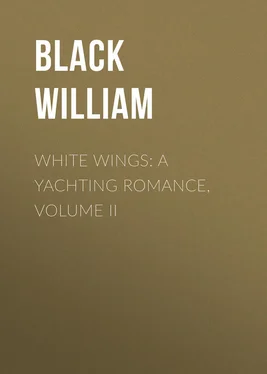William Black - White Wings - A Yachting Romance, Volume II
Здесь есть возможность читать онлайн «William Black - White Wings - A Yachting Romance, Volume II» — ознакомительный отрывок электронной книги совершенно бесплатно, а после прочтения отрывка купить полную версию. В некоторых случаях можно слушать аудио, скачать через торрент в формате fb2 и присутствует краткое содержание. Жанр: foreign_antique, foreign_prose, на английском языке. Описание произведения, (предисловие) а так же отзывы посетителей доступны на портале библиотеки ЛибКат.
- Название:White Wings: A Yachting Romance, Volume II
- Автор:
- Жанр:
- Год:неизвестен
- ISBN:нет данных
- Рейтинг книги:3 / 5. Голосов: 1
-
Избранное:Добавить в избранное
- Отзывы:
-
Ваша оценка:
- 60
- 1
- 2
- 3
- 4
- 5
White Wings: A Yachting Romance, Volume II: краткое содержание, описание и аннотация
Предлагаем к чтению аннотацию, описание, краткое содержание или предисловие (зависит от того, что написал сам автор книги «White Wings: A Yachting Romance, Volume II»). Если вы не нашли необходимую информацию о книге — напишите в комментариях, мы постараемся отыскать её.
White Wings: A Yachting Romance, Volume II — читать онлайн ознакомительный отрывок
Ниже представлен текст книги, разбитый по страницам. Система сохранения места последней прочитанной страницы, позволяет с удобством читать онлайн бесплатно книгу «White Wings: A Yachting Romance, Volume II», без необходимости каждый раз заново искать на чём Вы остановились. Поставьте закладку, и сможете в любой момент перейти на страницу, на которой закончили чтение.
Интервал:
Закладка:
But among all the subjects, grave and gay, on which the Laird touched during this repast, there was none he was so serious and pertinacious about as the duty owed by young people to their parents and guardians. It did not seem an opportune topic. He might, for example, have enlarged upon the duties of guardians towards their helpless and unprotected wards. However, on this matter he was most decided. He even cross-examined his hostess, with an unusual sternness, on the point. What was the limit – was there any limit – she would impose on the duty which young folks owed to those who were their parents or who stood to them in the relation of parents? Our sovereign mistress, a little bit frightened, said she had always found her boys obedient enough. But this would not do. Considering the care and affection bestowed on them – considering the hardly-earned wealth spent on them – considering the easy fortune offered to them – was it not bounden on young people to consult and obey the wishes of those who had done so much for them? She admitted that such was the case. Pressed to say where the limit of such duty should lie, she said there was hardly any. So far good; and the Laird was satisfied.
It was not until two days afterwards that we obtained full information by letter of what was known regarding the proceedings of Frederick Smethurst, who, it appears, before he bolted, had laid hands on every farthing of money he could touch, and borrowed from the credulous among his friends; so that there remained no reasonable doubt that the story he had told his niece was among his other deceptions, and that she was left penniless. No one was surprised. It had been almost a foregone conclusion. Mary Avon seemed to care little about it; the loss of her fortune was less to her than the shame and dishonour that this scoundrel had brought on her mother's name.
But this further news only served to stir up once more the Laird's slumbering wrath. He kept looking at his watch.
"She'll be off Easdale now," said he to himself; and we knew he was speaking of the steamer that was bringing his nephew from the south.
By and by – "She'll be near Kerrara, now," he said, aloud. "Is it not time to drive to the quay?"
It was not time, but we set out. There was the usual crowd on the quay when we got there; and far off we could descry the red funnels and the smoke of the steamer. Mary Avon had not come with us.
"What a beautiful day your nephew must have had for his sail from the Crinan," said the Laird's gentle hostess to him.
Did he not hear her? Or was he absorbed in his own thoughts? His answer, at all events, was a strange one.
"It is the first time I have asked anything of him," he said almost gloomily. "I have a right to expect him to do something for me now."
The steamer slows in; the ropes are thrown across; the gangways run up; and the crowd begins to pour out. And here is a tall and handsome young fellow who comes along with a pleasant smile of greeting on his face.
"How do you do, Mr. Smith?" says Queen T., very graciously – but she does not call him "Howard" as she calls Dr. Sutherland "Angus."
"Well, uncle," says he, brightly, when he has shaken hands all round, "what is the meaning of it all? Are you starting for Iceland in a hurry? I have brought a rifle as well as my breechloader. But perhaps I had better wait to be invited?"
This young man with the clear, pale complexion, and the dark hair, and dark grey eyes, had good looks and a pleasant smile in his favour; he was accustomed to be made welcome; he was at ease with himself. He was not embarrassed that his uncle did not immediately answer; he merely turned and called out to the man who had got his luggage. And when we had got him into the waggonette, and were driving off, what must he needs talk about but the absconding of Mr. Frederick Smethurst, whom he knew to be the uncle of a young lady he had once met at our house.
"Catch him?" said he with a laugh. "They'll never catch him."
His uncle said nothing at all.
When we reached Castle Osprey, the Laird said in the hall, when he had satisfied himself that there was no one within hearing —
"Howard, I wish to have a few meenutes' talk with ye; and perhaps our good friends here will come into the room too – "
We followed him into the dining-room; and shut the door.
" – just to see whether there is anything unreasonable in what I have got to say to ye."
The young man looked rather alarmed; there was an unusual coldness and austerity in the elder man's voice.
"We may as well sit down," he said; "it wants a little explanation."
We sate down in silence, Howard Smith looking more concerned than ever. He had a real affection, as we knew, for this pseudo-uncle of his, and was astounded that he should be spoken to in this formal and cold manner.
The Laird put one or two letters on the table before him.
"I have asked our friends here," said he, in a calm and measured voice, "to listen to what I have to say, and they will judge whether it is unreasonable. I have a service to ask of ye. I will say nothing of the relations between you and me before this time – but I may tell ye frankly – what doubtless ye have understood – that I had intended to leave ye Denny-mains at my death. I have neither kith nor kin of my own blood; and it was my intention that ye should have Denny-mains – perhaps even before I was called away."
The young man said nothing; but the manner in which the Laird spoke of his intentions in the past sense might have made the most disinterested of heirs look frightened. After ali, he had certainly been brought up on the understanding that he was to succeed to the property.
"Now," said he, slowly, "I may say I have shown ye some kindness – "
"Indeed you have, sir!" said the other warmly.
" – and I have asked nothing from ye in return. I would ask nothing now, if I was your age. If I was twenty years younger, I would not have telegraphed for ye – indeed no, I would have taken the matter into my own hands – "
Here the Laird paused for a second or so to regain that coldness of demeanour with which he had started.
"Ay, just so. Well, ye were talking about the man Smethurst as we were coming along. His niece, as ye may be aware, is in this house – a better lass was never seen within any house."
The Laird hesitated more and more as he came to the climax of his discourse: it was obviously difficult for him to put this restraint on himself.
"Yes," said he, speaking a little more hurriedly, "and that scoondrel – that scoondrel – has made off with every penny that the poor lass had – every penny of it – and she is left an orphan – without a farthing to maintain herself wi' – and that infernal scoondrel – "
The Laird jumped from his seat; his anger was too much for him.
"I mean to stand by her," said he, pacing up and down the room, and speaking in short ejaculations. "She will not be left without a farthing. I will reach him too, if I can. Ay, ay, if I was but twenty years younger, and had that man before me!"
He stopped short opposite his nephew, and controlled himself so as to speak quite calmly.
"I would like to see ye settled at Denny-mains, Howard," said he. "And ye would want a wife. Now if ye were to marry this young leddy, it would be the delight of my old age to see ye both comfortable and well provided for. And a better wife ye would not get within this country. Not a better!"
Howard Smith stared.
"Why, uncle!" said he, as if he thought some joke was going forward. We, who had been aware of certain profound plans on the part of Denny-mains, were less startled by this abrupt disclosure of them.
"That is one of two things," said the Laird, with forced composure, "that I wished to put before ye. If it is impossible, I am sorely vexed. But there is another; and one or the other, as I have been thinking, I am fairly entitled to ask of ye. So far I have not thought of any return for what I have done; it has been a pleasure to me to look after your up-bringing."
Читать дальшеИнтервал:
Закладка:
Похожие книги на «White Wings: A Yachting Romance, Volume II»
Представляем Вашему вниманию похожие книги на «White Wings: A Yachting Romance, Volume II» списком для выбора. Мы отобрали схожую по названию и смыслу литературу в надежде предоставить читателям больше вариантов отыскать новые, интересные, ещё непрочитанные произведения.
Обсуждение, отзывы о книге «White Wings: A Yachting Romance, Volume II» и просто собственные мнения читателей. Оставьте ваши комментарии, напишите, что Вы думаете о произведении, его смысле или главных героях. Укажите что конкретно понравилось, а что нет, и почему Вы так считаете.












